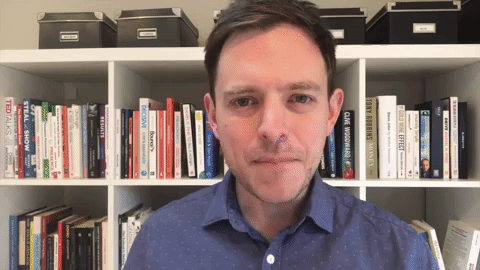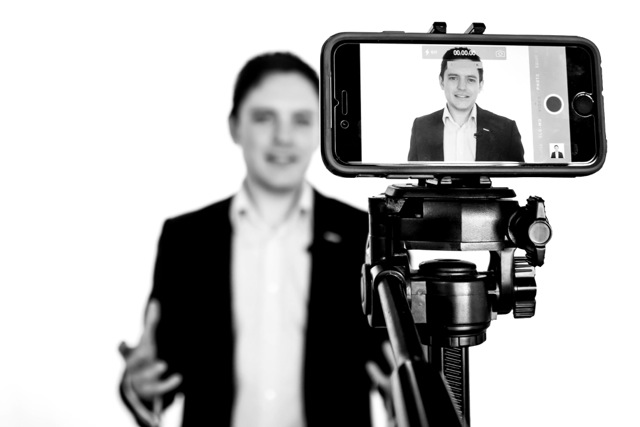In our "Rapid Success" video series Dominic delivers a top communication tip in 90 seconds or less. In this video he gives you his top tip on how to super charge your performance…
The Power Of Imagination
On Monday I overheard my daughter playing in her cot. She was completely engrossed in a magical world of her own creation. I put a short post about my observations on Facebook and my wall exploded. The need for us adults to engage our imaginations seemingly struck a chord.
Yesterday I spent the day teaching a group of engineers the art of storytelling. At first I worried that it might be a hard sell, too far removed from their world of facts and figures. I couldn’t have been more wrong. Their desire to play, to connect with each other on a simpler, more human level was inspirational.
So why is imagination important? And what are the creative lessons that we can take from the world of make-believe and the arts, that can help us succeed in business?
Stay Creative
It may seem obvious, and I’m sure someone else has said it more eloquently but if you can’t imagine something you will never create it. Our ability to envisage the future, to dream big, to think the impossible, is what separates human beings from other mammals and ultimately drives our society forward. Even 20 years ago not many people believed that space travel would be possible for the man on the street. Today, if you head on over to Richard Branson’s Virgin Galactic website you can complete an application form to become an astronaut! In just the last few weeks scientists at Penn University in the USA have been able to 3D print blood vessels. And Elon Musk’s Hyperloop technology has taken a massive step forward and could see us traveling to our destinations in specialised pods at the speeds of up to 760mph. The future is coming! But the only reason it’s coming is that people were brave enough to dream. To think creatively about the worlds problems and push the boundaries of what is possible. It’s easy to fall in repetitive patterns and assume that your situation or the things that you’re working on can’t change. Challenge your perception and ask yourself the magical question “What if…?”
Stay Flexible
I’ve written about the importance of staying flexible before. Our ability to adapt is key to our continued growth both individually and organisationally. When we allow our imaginations to run free something exciting happens. We open up a world of possibilities. We start to see options rather than obstacles. At drama school young actors learn to improvise, a incredibly vulnerable practice but one that can be incredibly liberating. One of the key rules of any successful improvisation is to “accept every offer”. You are taught not to block ideas but to run with them. No matter how odd a curve ball you get thrown, your job is to build on it rather than push back. That doesn’t always happen in “real life”. Human beings have an inbuilt negative bias, its a natural protection mechanism that’s designed to stop us getting eaten by sabre tooth tigers and other dangerous predators but it has no real function in the twenty first century workplace. Instead of saying “yes but….” to the next offer that comes your way, what would it be like to say “yes and….” instead?…
Stay Playful
To quote Plato “You can discover more about a person in an hour of play than in a year of conversation”. When we play, we allow ourselves to connect. We let our guards down and become more human. Play helps us build relationships. Think back to your school days, I bet you can remember the kids who were on your sports team or in your orchestra better than the kids who were in your biology class. Why? Because through the collective experience of playing together, you created stronger bonds. Play is also fun. It provides variety, makes us feel good and boosts performance. When we take time out of the “norm” to do something different, we recharge our batteries. There’s a reason why Pixar animators can decorate their offices in any way they choose… What would happen if rather than looking at problems in a linear way, we were prepared to see them through the eyes of a child and play with them until we found a better solution?
The imagination is one of the most powerful tools in our tool kits but all too often it’s left rusting at the bottom of the bag. I believe that the more we engage with it and dare to use it, the more happy, successful and prosperous we will be.
I’d love to hear your observations about how the power of the imagination has impacted you or your business. Please feel free to share some magic in the comments box below ;-)
Keep shining, and creating and flexing and playing!
Dominic
Speaking On Camera: An Actor’s Top 5 Tips
I spent yesterday in the studio. That statement sounds very grand… the reality was somewhat more chaotic. The furniture in the office pushed against the walls, a white sheet erected for a back-drop, several lights cluttering the floor space and my iPhone 6 attached to a tripod to record the proceedings. Very soon you’ll be able to judge the results for yourselves as I start releasing the videos on YouTube but I’m amazed at what can be achieved using such a simple set up. In fact the resolution of the finished product will be significantly higher than the footage I have from an episode of Doctors I shot for the BBC 10 years ago. It’s amazing how far technology has come!
Being in front of the camera is something that feels quite natural for me now. It’s something I’ve been doing for a long time. But it wasn’t always that way. The first time I did it, I was absolutely petrified. I’d had the amazing good fortune to be cast in a big budget BBC period drama called The Lost Prince which was directed by the legendary Stephen Poliakoff. In the cast were some of Britain’s finest actors, Michael Gambon, Miranda Richardson, Tom Hollander, Bill Nighy and me… 20 years old, completely new to television and desperate not to make a fool of myself!
As I stepped up to shoot my first scene I was a nervous wreck. All the main cast were there along with about 200 extras! The pressure was huge. My lines kept flying out of my head and I just couldn’t remember what I was meant to say next. My hands were shaking and my voice felt tight. The camera was rolling and the director shouted “Action!”. A complete jumbled mess came streaming from my mouth. “Cut!” I heard Stephen cry and we reset to shoot again. I was mortified. The second take was no better. What was I going to do? It was Michael Gambon that broke the ice. All of a sudden he burst out laughing, stood up and started clapping!! He could see that I was struggling and came to my rescue offering words of reassurance. I instantly relaxed, smiled, took a deep breath and the third take was word perfect. That first TV job taught me so much about how to work on camera and I’ve been lucky enough to learn many valuable lessons throughout my career, so I thought I’d use this blog to quickly share my top 5 tips.
1. Don’t take yourself too seriously
This was my major take-away from that first challenging experience in front of the camera. The more I worried about what other people were thinking of me the worse I performed. It’s easy to become very self-conscious and serious when you’re looking down the lens. Try to stay playful and give yourself a break. The beauty of digital cameras is that you can do as many takes as you need to get the right footage, so don’t worry about getting it right first time.
2. It’s all in the eyes
The eyes are the windows to the soul and this is especially true on camera. The lens has an amazing ability to pick up on your emotion and we tend to see it in the eyes. Think happy thoughts and the eyes sparkle on screen. If you’re feeling sad or tired the eyes will seem dull and lifeless. Make sure that your mental state matches your objective when speaking on camera. If you want your audience to be excited and inspired by your message, you need to be completely energised. If you’re not, they’ll see it in your eyes.
3. Warm up your face
When we’re in a room talking to someone they can normally see our whole body. When we’re speaking on camera they normally only get to see our head. This mean’s all the extra information conveyed in our body language needs to be channeled into our facial expression. I’m not suggesting for a second that you start gurning or doing strange things with your lips to get your audience’s attention but you do need to make sure everything is alive and warmed up. There are a staggering 42 muscles in the face, so having a stretch, blowing through the lips and screwing everything up before you go on camera will make sure the lens really captures your emotion and gets your message across.
4. Treat the camera like a friend
It’s important to remember that when you look directly down the lens of a camera you are looking straight into the eyes of your audience. To make the connection between you and the viewer really strong, the best piece of advice I was ever given was to imagine that you are talking to a friend. If you treat the camera as if it is someone you like and trust, that will come across in what the audience sees. It’s a really simple technique to implement and it makes a massive difference to your performance.
5. Don’t be afraid to go off script
Obviously if you’re acting in a big budget feature film this tip isn’t really an option (unless the director gives you permission) but when we’re making videos in order to connect with and serve our audience sometimes a full script can make things too rigid. If you’re not experienced in the actor’s art of bringing word off the page, you can often come across as wooden or stilted. In my experience it’s much better to sketch out a few bullet points that you want to talk about and use the other 4 tips above to bring them to life. There’s something about an “off the cuff” video that gives you real credibility and builds trust with the audience. So, next time you’re tempted to write the whole things out, take a risk and shoot from the hip instead. I guarantee that the results will be more authentic and engaging.
I hope you found these tips useful and would love to hear any other things you do to come across like a pro on screen, so leave your comments in the box below or tweet me @dominiccolenso.
Good luck with your videos.
Keep shining!
Dominic
Star Quality: What is it and how can you develop it?
Sunday night was an important night in the British Theatre calendar. Some of the biggest names is show-business gathered at London’s Royal Opera House for the 39th annual Oliver Awards, ready to celebrate the best performances, productions and stage craft of the previous twelve months.
One of the highlights for me was seeing arguably two of the worlds greatest living actors sharing the stage. After 10 years at the helm of the Old Vic Theatre, Kevin Spacey is standing down as Artistic Director. So who better to present him with an outstanding contribution award than the wonderful Dame Judy Dench? Watching these two amazing performers standing side by side, I was struck by the ease with which they held the entire audience in the palms of their hands. Without a shadow of a doubt this was a faultless display of “Star Quality”. So what exactly is it that made them so easy to watch and how can you or I get hold of some of the “fairy dust”?
Stay Present
The key to lighting up the stage (or the meeting room) is to be truly present. Just as the word suggests, presence is about being in the “here and now”. It’s one of the most popular topics that my clients ask for my help with and with some conscious effort it’s relatively simple to fix. We live in an incredibly busy world. Emails, text messages, phone calls, plus a million-and-one push notifications from our various social media channels, all compete for our attention. If we’ve just walked out of a bad meeting or know we have a difficult conversation coming up later in the day, sometimes it is very hard to shake those things off and focus on the task at hand. The best way to engage with your audience, whether from the stage or in a one-to-one situation is to make sure that you stay with them in the moment. Don’t allow your attention to wonder or allow other things to distract you. Taking a deep breath and finding a moment to pause before you start a new interaction are a great ways to ensure that you don’t carry your past, or your future into your present.
Care About Your Audience
Another word for “present” is “gift”. When we make the people we are talking to feel special, when we are generous, when we take the time to care, we instantly begin to develop “The X Factor” as a communicator. Human beings are very good a spotting a fake. If you don’t genuinely demonstrate respect for your audience (especially when delivering a difficult message) you instantly begin to loose rapport. What actors like Dench and Spacey do so well is make the audience feel comfortable and at home. We’re never worried about what they might say next. Instead we feel like we’re listening to an old friend, completely at ease and excited to hear what they have to say next. When you focus on yourself and forget about the people you are talking to, you instantly increase your own anxiety and alienate those listening. Shine your light on your audience instead and your “Star Quality” will be visible for all to see.
Enjoy Yourself
Whilst it’s sometimes easier said than done, enjoying your time in the limelight is vital if you want to be remembered as a star performer. That doesn’t mean you need to use “jazz hands” or crack lots of jokes. However, it’s a simple fact that if you are enjoying yourself, then your audience are much more likely to be enjoying themselves too. Enthusiasm is infectious! Great communication is a skill that can be learned and as with anything you want to master, targeted practice is vital. Many famous actors freely admit that whilst their performances appear effortless on stage or in front of the camera, in their private lives they are very shy and introverted. Look for opportunities to practice and to step outside of your comfort zone. The more you do it, the easier and more enjoyable engaging with an audience will become.
You don’t have to be an award winning actor to be have “Star Quality”. On a regular basis I am lucky enough to work with people from all walks of life who discover their power to excite and inspire. They touch the hearts and minds of their audience and their message has lasting impact. What steps do you need to take today so that you shine more brightly? I’d love to hear your comments in the box below.
Keep shining!
Dominic









